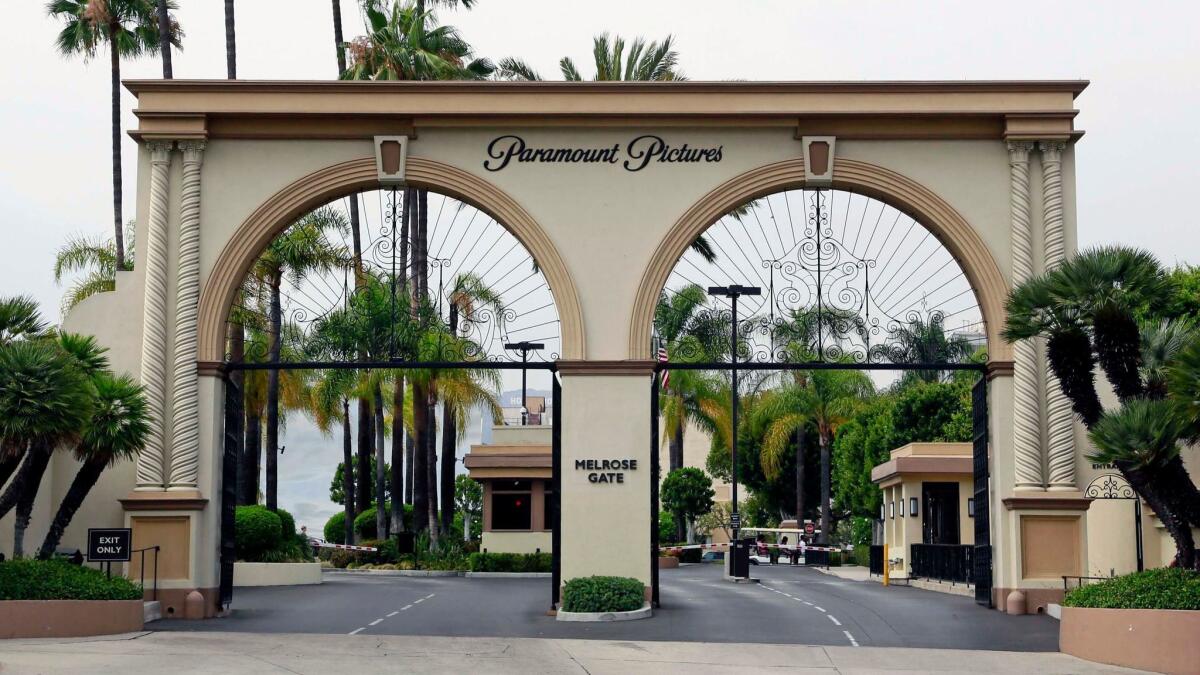Op-Ed: Actors won’t move Trump, but the studios could

- Share via
The 14th Academy Awards ceremony was held on Feb. 26, 1942. That was the year “Citizen Kane” lost the best picture and director Oscars to John Ford’s “How Green Was My Valley.”
What is less well remembered about the ceremony is that it was celebrated one week to the day after one of the more shameful dates in American history: On Feb. 19, 1942, President Franklin Roosevelt signed Executive Order 9066, beginning the Japanese internment.
As far as I can tell from newsreels and wire-service reports, no one at the 14th Academy Awards mentioned what had happened the week before. It was a confusing and terrifying time, no doubt. Pearl Harbor was a fresh memory. America was at war. A fearful nation — and by its silence, the motion picture industry — went along with the rounding up of innocent citizens, neighbors and friends “for protection against espionage and…sabotage.”
We in the entertainment industry bear partial responsibility for creating our reality television-personality president.
Now President Trump has signed another shameful executive order barring refugees and foreign nationals from seven nations from entering the U.S., at least temporarily. It too makes inflated security claims, in this case about “protecting the nation from foreign terrorist[s].”
I wrote the screenplay for the 2012 film “Argo,” which was set during the Iran hostage crisis, and so it is of particular interest to me that one of the seven nations affected by the order is Iran — a nation whose citizens are responsible for exactly none of the terrorist acts on U.S. soil since 9/11.
Because of the ban, Asghar Farhadi, the Iranian filmmaker nominated for foreign film this year for “The Salesman,” will not attend this year’s Oscar ceremony (which, by the way, will be held 75 years to the day after the 1942 awards). Even if an exception were to be made for him, Farhadi said in a statement released shortly after the U.S. travel ban was announced, the “ifs and buts” of the order were unacceptable, and he could not, would not attend.
I know Farhadi only through his films — which are intelligent, original and fiercely humane. He is one of a long line of master Iranian directors — such as Majid Majidi, Jafar Panahi and the late Abbas Kiarostami — whose films transcend politics and ideology, and whose voices are more necessary than ever in the current political environment.
None of them would be welcomed to the United States in the next three months, or possibly ever again, by a president whose most memorable contribution to the arts was a 1985 guest appearance on “The Jeffersons” in an episode entitled “You’ll Never Get Rich.” (If you think I’m making that up, IMDB it.)
We in the entertainment industry bear partial responsibility for creating our reality television-personality president. In turn, we have a responsibility to be exactly the opposite of silent about his actions.
Celebrity tweets or speeches delivered from Hollywood awards stages are unlikely to have much effect on the president, who seems emboldened by such scoldings from even the most revered figures in entertainment (see: “overrated” actress Meryl Streep).
The heads of the studios, however, would be harder to ignore. Hollywood is responsible for more than $500 billion of the nation’s GDP; commerce is a language Trump speaks. Yet the major movie studios have been almost uniformly silent — at least in public — perhaps because their parent companies fear the president’s impulsive, Twittering thumbs.
So it’s 1942 in Hollywood all over again — not on the awards circuit but, shamefully, in the boardrooms of the major studios.
At the 1941 Oscars, the year before his Japanese internment order, Roosevelt personally appealed to Hollywood — by radio — to support America as the “arsenal of democracy.” It was a message of praise and of hope in a time of rising fascism, and it’s a reminder of Hollywood’s duty three quarters of a century later.
“We’ve seen the American motion picture industry,” he said, “reflect the aims and the aspirations and the ideals of a free people and of freedom itself.”
Academy Award winner Chris Terrio wrote the screenplay for Warner Bros.’ tentpole “Justice League,” which will be released this fall.
Follow the Opinion section on Twitter @latimesopinion and Facebook
A cure for the common opinion
Get thought-provoking perspectives with our weekly newsletter.
You may occasionally receive promotional content from the Los Angeles Times.






